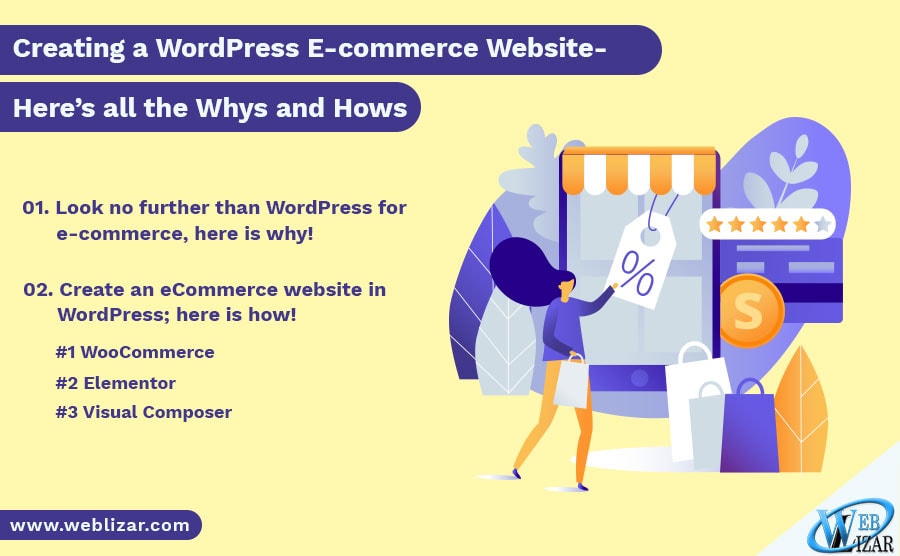WordPress is no longer a buzzword; it has become a norm chased by almost all organizations as well as individuals aiming to create an amazing website. And combining WordPress to your eCommerce site is more like placing the cherry on the cake- nothing suits better! The following post emphasizes on learning about all the why’s and how’s required when creating a WordPress eCommerce site.
Entering the digital realm is something innovative; it has become more like a rat race where everyone either had this sudden realization of monetizing their hobby by writing blogs or giving a shot in the eCommerce business as it’s considered more profit spinning.
However, create an eCommerce website is not a tricky job as there are dozens of CMS available such as Shopify, Prestashop, and Magento, making the task simpler and better. Now if you ask me which I assume you do- I would recommend using WordPress eCommerce site. Let me show you the reasons of my choice.
Look no further than WordPress for e-commerce, here is why!
Popularity, widespread adoption is one of the most crucial reasons for choosing the content management system. According to sources, due to its ability to confer simple usability and provide high-quality features to websites of all types, has succeeded in overcoming the misconception that traditionally belies it.
However, anything that is popular is bound to have some naysayers, so definitely, you will find people who disagree when it comes to using WordPress for eCommerce.
I mean lots of people like Ed Sheeran, but that doesn’t mean you should all time keep listening to his songs just because of his popularity. Yes, I am making a contradictory statement here, but all I want is for you to focus on the essential pros of using WordPress for eCommerce.
Being an open-source platform, your WordPress online store will be entirely free for you. All you have to do is pay for your hosting service and domain name. Fortunately, there are lots and lots of reliable and inexpensive hosting services available around so try them, and your WordPress eCommerce site might cost you around 4$ per month.
Another advantage of using an open-source product means you can join the developer’s team if you want. As a business owner, it’s excellent to keep oneself update with involvement at regular intervals. You can experience how the WordPress team fixes the bugs and tries to make the whole project better. With a vast community, you will have several professionals at your service who can help with coding and stuff.
The content management system is considered pretty user-friendly, so gone are the days when you required a user manual on learning about the admin dashboard and how different functionalities of your site work. Even if you get stuck somewhere or is something bothering you, you will find plenty of written and video tutorials about WordPress that are of great help!
Last but certainly not the least, the plugins.
If simply put, plugins are ready-made solutions for every function you need. And you know what’s the best part is, most of them are available for free! Other than such versatility and flexibility, plugins can even boost your SEO and loading speed. Each feature in the content management system helps you become visible in the search results list.
Create an eCommerce website in WordPress; here is how!
#1 WooCommerce
This is one my favorite, and that’s the reason why it is first on the list. Kidding! The reason behind WooCommerce dominating the race is it supports more than a million active installs and not only that it successfully covers more than a third of the entire online shop market.
These numbers have only been increasing since then. Best suitable for selling both digital, physical, and affiliate products. It offers product variations, different payment gateways and shipping options, is developer-friendly and integrates well with almost any theme.
#2 Elementor
Featuring the best drag and drop builder, Elementor adds great page builder functionality to the site. In addition to this, there are lots of plugins created to expand the available functionality of Elementor. The JetWooBuilder plugin adds around 19 widgets to the Elementor customization panel. It’s free, flexible, featuring a vast community are some of the pros of using this eCommerce website builder.
#3 Visual Composer
Another exciting website builder that can customize the ready-made template pages. Again this one is a drag and drop page builder making interface and functionalities quite simple. Lastly, the number of available widgets is adequate enough to create a friendly and efficient WordPress eCommerce site.

